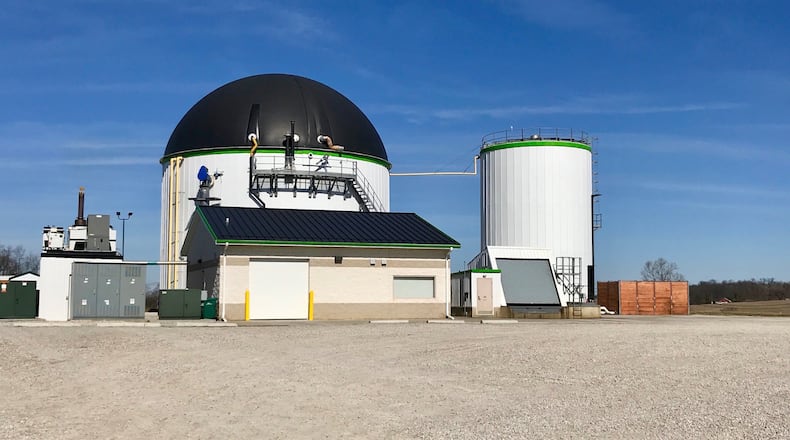The company appealed the BZA ruling and Greene County Common Pleas Judge Michael Buckwalter on Thursday sided with Renergy.
Some residents have protested the smell coming from the biodigester since the facility was built in 2014. Over the years, numerous residents have complained to the Ohio EPA about the smell. The Ohio EPA has visited the Dovetail site multiple times to check on the smell. The operation was cited for starting construction a few days before the permits were final. The site was owned by Quasar then. Renergy bought the company out in 2017.
Anaerobic digesters are enclosed entities in which agricultural or food waste is stored and produce liquids and gases as the waste decomposes.
Fairborn and Bath Twp. residents said they have reported the smell from the facility on the Smell My City app nearly every day. Smell My City is a smartphone app designed to crowdsource reports of pollution odors.
Bradley Martin, who lives near the biodigester, said this ruling is “heartbreaking.”
“We just want a community where we can open our windows and enjoy the air,” Martin said.
Cari Oberfield, Renergy’s chief operating officer, said the company was pleased with Buckwalter’s decision.
“We are pleased that every judge who has considered these facts has found in favor of Renergy. We now consider this case resolved and will continue moving forward with our mission to reduce carbon emissions by recycling food and farm waste for beneficial use and producing renewable, clean energy, which is good for the environment and public health,” Oberfield said.
Legal fight started in 2019
The legal fight over the facility began in 2019 when a outside prosecutor was brought in to advise the township. Renergy and Bath Twp. Trustee Tom Pitstick, whose farm the biodigester operates on, were sent a letter from that prosecutor saying that the operation was in violation of both the Ohio Revised Code and Bath Twp. zoning code. The letter stated that Dovetail had 30 days to correct the violation. “Failure to correct this violation will result in legal action,” the prosecutor stated in the letter.
The letter stated that because at least half of the feedstock used for the production of energy and biodiesel production was not from the Pitstick farm that it was not deemed an agricultural use.
The bio-energy company and Pitstick appealed that order and continued to operate.
“I’m fighting for my town. I’m not going to let some stupid industry that makes millions of dollars come in and destroy my town,” said Fairborn resident Lorie Venable. “Fairborn is going to be known as the stinkiest town in Dayton.”
Venable said she thinks Fairborn will suffer if the biodigester continues to operate and people will choose not to move to the area.
Martin said he surveyed his neighbors and others living near the biodigester. Many said they felt the smell was so bad that if they had known about it before moving to the area, they would not have moved there.
“Quite frankly, I think we might see a lot of families considering moving out of the area very, very soon,” Martin said. “This is not just a bad smell for us, we see this as a threat to our environment and our health.”
Venable said the group of residents have asked state legislators and Gov. Mike DeWine for help. None of them have responded, she said.
‘We will raise a stink’
Now that the court has sided with Dovetail, some residents are concerned that the company will continue with plans to build two more storage lagoons on the Pitstick property.
The proposed lagoons would store the by-product of the anaerobic biodigester processes, which can then be used as fertilizer. Dovetail’s request to expand was put on hold when the 2019 zoning battle started.
“We will raise a stink like we have in the past,” Venable said.
Oberfield said the company has no plans right now to reapply for the additional lagoons.
During the March 2020 BZA hearing, Renergy attorneys claimed that the operation is considered a public utility and not subject to township zoning laws. On Feb. 9 an attorney for Renergy filed a notice in one of its lawsuits declaring it a public utility. This notice mentions that in Morrow County, where a sister facility is located, a judge ruled that the anaerobic digester operation is a public utility.
The attorney representing Bath Twp. filed a brief stating that Morrow County ruling was “incorrect.”
The Morrow County Renergy facility earlier this month had a spill, according to Oberfield. The company said this happened during a standard land application and a hose failed. The Ohio EPA and Ohio Department of Natural Resources were notified, the company said. Neighbors are concerned something similar could happen here.
Dovetail pays public utility personal property taxes to the state and to Greene County and has been since 2015, Buckwalter’s order says. Dovetail also is certified as an “Ohio Renewable Energy Resource Generating Facility,” the order says.
“(The) Dovetail biodigester facility is a public utility exempt from township zoning requirements pursuant to (Ohio Revised Code),” the order says.
Both parties have 30 days to file an appeal of Buckwalter’s order.
Martin said he hopes the township appeals the decision. Venable said many residents hope the township appeals.
Pete Bales, Bath Twp. administrator, said that the township is “analyzing the decision handed down by Judge Buckwalter” and “looking very carefully at everything.” He was not sure yet whether the township will file an appeal.
There is still a class action lawsuit against Renergy from a Fairborn resident that is pending in Greene County courts.
The suit alleges the smell from the Dovetail operation has interfered with the residents’ use and enjoyment of their property. The lawsuit also says a properly operated facility would prevent the odors from the facility from invading the homes and property of those living nearby.
About the Author

